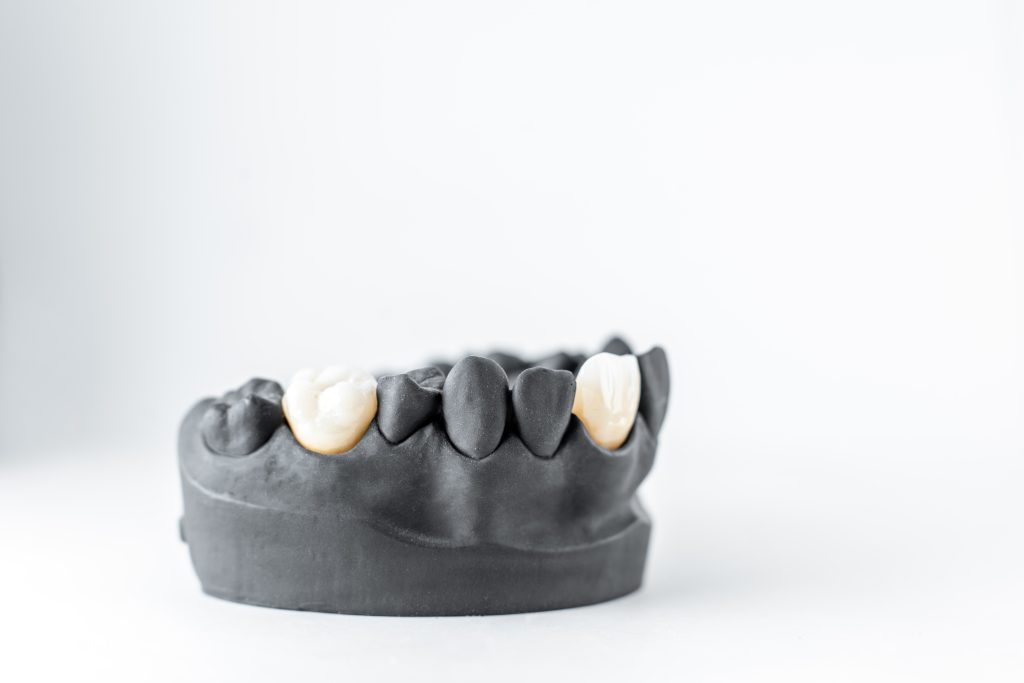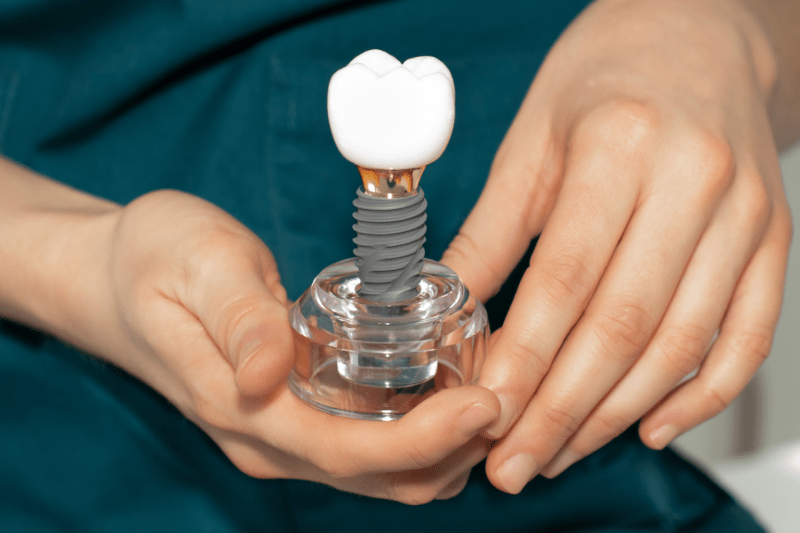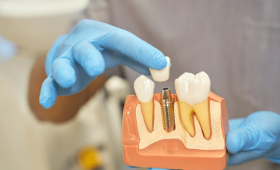What Are The Prices For Dental Implants In Newcastle?
The prices for dental implants in Newcastle vary depending on the complexity of the treatment, the number of implants, and the quality of the materials used. On average, the cost of a single dental implant can range from £2,000 to £4,000. This price includes the implant itself, the abutment, and the crown. However, if additional procedures such as bone grafting or sinus lifting are required, the costs can increase significantly. These high costs lead many people in the UK to look to countries like Turkey, where they can receive the same quality service at more affordable prices.
Are Dental Implants Safe In Newcastle?
Dental implant procedures in Newcastle are extremely safe, in compliance with modern dentistry standards and strict regulations. These procedures, performed by experienced dentists in sterile clinical conditions, have a low risk rate. The implant brands used are generally approved by international authorities. However, as with any surgical procedure, there are potential risks such as infection or healing problems. The success of the treatment depends on both the expertise of the dentist and the patient’s strict adherence to post-treatment instructions.
How Is The Dental Implant Procedure Performed?
The dental implant procedure in Newcastle is usually completed in several stages. First, a comprehensive examination and imaging (X-rays, 3D tomography) are performed by the dentist. Then, the implant is surgically placed into the jawbone under local anesthesia. A healing period called “osseointegration” is usually waited for 3-6 months. During this period, the implant fuses with the bone. In the final stage, the abutment and the aesthetic crown are placed on the implant. Patient comfort is a priority throughout the entire process.
What Is All On 4 Treatment And How Is It Performed In Newcastle?
All On 4 treatment is a method that involves placing a fixed prosthesis on four implants for patients who have lost all their teeth. In Newcastle, this treatment is performed by experienced surgeons using advanced technology. This method eliminates the need for bone grafting, shortening the treatment time. The ability to fit a temporary prosthesis on the same day allows patients to have new teeth in a short time. However, the cost of this procedure is quite high. Health tourism companies like Cure Holiday offer more economical and high-quality solutions in this regard.

How Long Do Dental Implants Take To Settle?
The process of dental implants fully integrating with the jawbone (osseointegration) varies depending on the patient’s general health and the quality of the jawbone. This process usually takes 3 to 6 months. This period is necessary for the implant to become stable and gain the strength to support the permanent prosthesis to be placed on it. In some cases, if the jawbone has sufficient volume, “single-session implant” applications may also be possible. However, this is not suitable for every patient.
Why Are Dental Implants So Expensive?
The cost of dental implants is due to the high quality of the materials used, the advanced technology in implant production, and the surgical expertise required for the procedure. Implants are usually made from expensive materials like titanium, which are biocompatible and durable. In addition, the operational costs of the clinic, personnel expenses, and the depreciation of the equipment used also affect the prices. These factors lead to very high prices, especially in the UK.
How Should Dental Implants Be Cleaned?
Cleaning dental implants should be done regularly and meticulously, just like natural teeth. A soft-bristled toothbrush and special interdental brushes recommended by the dentist should be used. Auxiliary tools like dental floss or a water jet can also be used to clean the areas around the implants. It is important to brush at least twice a day to prevent plaque buildup and keep the tissue around the implant healthy. It should not be forgotten that good oral hygiene prolongs the life of the implant.
Is The Care Of Dental Implants Difficult?
The care of dental implants requires a routine similar to that of natural teeth and is not difficult. Regular brushing, flossing, and using mouthwash ensure that the implants and the surrounding gums remain healthy. Neglecting care can lead to an infection called peri-implantitis, which can cause the implant to be lost. Therefore, paying attention to regular oral hygiene and visiting the dentist for check-ups every six months is of great importance.
How To Find An Expert Dentist For Dental Implants In Newcastle?
Finding a specialist dentist for dental implants in Newcastle requires comprehensive research. The dentist’s experience in implantology, their training, and certifications should be examined. It is also important to look at the comments and references of previous patients and to get information about the clinic’s technology and hygiene standards. Clinics that offer pre-treatment consultation services can help the patient make the right decision. International consultancy firms like Cure Holiday can support you in this matter.
What Should Be Considered Before Implant Treatment?
The preparation process before implant treatment is of vital importance for the success of the treatment. The patient’s general health status, any chronic diseases (such as diabetes), or medications used should be shared with the dentist. Since smoking negatively affects the implant healing process, it is recommended to quit before and after the treatment. The dentist will perform a detailed examination to determine if the bone density is sufficient.
Is Implant Treatment Painful?
Dental implant treatment is usually performed painlessly thanks to modern anesthesia techniques. Since local anesthesia is applied during the placement of the implant, the patient does not feel any pain. After the treatment, a slight pain or discomfort may be felt. This condition can be easily controlled with painkillers prescribed by the dentist and will pass in a few days.
What Is The Difference Between A Single Tooth Implant And Multiple Tooth Implants?
A single tooth implant is used to replace only one missing tooth, while multiple tooth implant treatment allows for the replacement of several missing teeth. Multiple dental implants are preferred in cases where more than one implant is used to support a bridge prosthesis. This method allows restoring a larger area with fewer implants, instead of a separate implant for each missing tooth.
What Is The Success Rate Of Dental Implants?
The success rate of dental implants is generally over 95% and is considered one of the most reliable procedures in modern dentistry. Factors affecting success include the patient’s general health, smoking habits, oral hygiene, and the dentist’s experience. The quality and quantity of the jawbone where the implants are placed also directly affect the success rate. In case of failure, a new implant can usually be placed.
What Are The Dental Implant Warranty Conditions In Newcastle?
Many dental clinics in Newcastle offer a warranty for the dental implants they apply. This warranty is generally offered as a lifetime warranty for the implant itself, while the warranty for the prosthesis and other parts may be shorter (e.g., 5-10 years). Warranty conditions vary depending on the implant brand and the clinic’s policy. It is of great importance for patients to learn about the warranty conditions in detail before starting the treatment.
How Long Does Dental Implant Treatment Take?
Dental implant treatment is a process that usually takes several months as it consists of several stages. While the first stage, the implant placement procedure, takes about 1-2 hours, bone healing can vary between 3 and 6 months. During this process, the implant is expected to fuse with the bone. After that, the preparation and placement of the prostheses can take a few weeks. However, clinics in Turkey manage this process more efficiently, allowing patients to save time. Cure Holiday plans all the organization for you.
How Does The Healing Process Work After Implant Treatment?
The healing process after implant treatment usually proceeds smoothly. Mild swelling, bruising, and sensitivity are normal for the first few days after the procedure. These symptoms can be reduced with cold compresses and medications recommended by the dentist. Paying attention to oral hygiene accelerates the healing process. Full recovery and bone fusion of the implant take 3 to 6 months, and the permanent prosthesis is placed at the end of this period.
How Are Dental Implants Made?
Dental implants are small, screw-like structures surgically placed into the jawbone. This screw is usually made of titanium and mimics the root of the lost tooth. After the implant is placed, it fuses with the bone in a process called “osseointegration”. This allows the implant to form a strong foundation. A superstructure such as a dental crown, bridge, or prosthesis is then mounted on the implant. In this way, patients gain a chewing function closest to natural teeth.

What Factors Affect Implant Prices?
Dental implant prices vary depending on many factors. The most important among these are the brand and quality of the implant, the number of implants, the need for additional procedures (bone grafting, sinus lifting), and the dentist’s experience. In addition, the city where the clinic is located, the technological equipment used, and laboratory costs also directly affect the prices. For these reasons, prices can vary even for the same treatment.
What Is The Difference From Traditional Dentures?
Dental implants are a much superior solution to traditional dentures. While traditional dentures can cause slipping or shifting in the mouth, implants provide a fixed and solid foundation. This helps patients chew food more comfortably and speak more clearly. In addition, implants stimulate the jawbone, preventing bone loss, while dentures can accelerate this bone resorption. Implants offer a longer-lasting and more comfortable use.
Is There An Age Limit For Implant Treatment?
Although there is no age limit for dental implant treatment, the patient must have completed their jawbone development. This is usually around 18 years of age. There is no upper age limit; if the patient is in good general health and the jawbone is sufficient to support the implants, it can be applied successfully at an advanced age. What is important is that a chronic disease does not prevent the treatment.
In Which Cases Can Implant Treatment Not Be Applied?
Implant treatment may not be applicable in cases such as uncontrolled diabetes, severe heart disease, insufficient bone density, or active periodontitis (gum disease). The success rate may also decrease in smokers and heavy alcohol consumers. Therefore, it is of vital importance to provide all information about your general health to the dentist before the treatment.
When Can I Return To Normal Life After Treatment?
After dental implant treatment, patients can usually return to their normal lives within a few days. It is important to eat soft foods for the first few days after the procedure. Symptoms such as pain and swelling will decrease within a few days. Although the full healing process takes several months, patients can continue their work and social activities comfortably during this period.
What Is The Difference Between Porcelain Crowns And Zirconia Crowns?
Porcelain crowns offer an aesthetic appearance very similar to natural teeth and reflect light like natural teeth. However, they are more fragile than zirconia crowns. Zirconia crowns, on the other hand, do not contain metal and are much more durable. For this reason, they can better withstand the chewing force in the back teeth. Zirconia crowns are also more biocompatible as they do not carry a risk of allergies. Health tourism companies like Cure Holiday offer both options.
Does Insurance Cover Implant Treatment?
In the UK, dental implant treatment is generally not covered by the NHS (National Health Service) and is considered a private procedure. Some private health insurance or additional health plans may cover part or all of the treatment. However, most insurance companies provide limited coverage for such aesthetic and surgical procedures. This makes affordable treatment options in countries like Turkey more attractive.
What Is The Sinus Lifting Procedure?
Sinus lifting is a surgical procedure applied in cases where the sinus cavity expands as a result of the extraction of the molars in the upper jaw. In this procedure, the sinus cavity is raised to create sufficient bone volume for implant placement. Sinus lifting is a critical preparatory stage for the successful application of implant treatment and is usually performed a few months before the implant treatment.
What Is Bone Graft (Bone Powder) Application?
Bone grafting is a surgical procedure applied to patients who do not have sufficient bone volume for dental implant placement. In this procedure, the jawbone is strengthened using bone tissue taken from the patient’s own body or synthetic bone material. Bone grafting creates the bone structure necessary for the implants to hold securely. This can extend the treatment time but is essential for a successful outcome.
What Happens If An Implant Fails?
The risk of implant failure is very low, but if it occurs, the implant is usually removed and the healing process is awaited. After healing is complete, a new implant can be placed in the area. The cause of failure is usually factors such as the implant not fusing with the bone (osseointegration) or infection. With early diagnosis and intervention, implant failure can be prevented.
What Are The Tips To Increase The Longevity Of Dental Implants?
The most important factor to increase the longevity of dental implants is to have excellent oral hygiene. It is necessary to keep the area around the implant clean with regular brushing, flossing, and special interdental brushes. It is also important to avoid chewing hard foods and to limit the consumption of alcohol. Going for a regular dental check-up every six months is vital for the early diagnosis of possible problems.
How Reliable Is Implant Treatment?
Dental implant treatment is one of the most reliable and most frequently performed procedures in modern dentistry. The success rates are very high, and implants can last a lifetime when they are placed correctly and cared for. As long as it is performed by an expert dentist in a sterile environment, implant treatment is an extremely safe investment. Cure Holiday offers you the opportunity to work with reliable clinics in this regard.
What Is The Best Treatment Option For Those With Tooth Loss?
The best treatment option for those with tooth loss is generally dental implants. Implants not only allow for the replacement of the missing tooth, but also prevent jawbone loss and help protect adjacent teeth. Other options (bridges or dentures) do not support the jawbone and can lead to additional problems in the long run. Implants provide the best result both aesthetically and functionally.
How Do Oral Hygiene Habits Affect Implant Success?
Oral hygiene habits are the most important factor directly affecting implant success. Poor oral hygiene can lead to the accumulation of bacteria around the implant, causing an inflammatory condition called peri-implantitis. This can lead to the resorption of the bone supporting the implant and the loss of the implant. Therefore, patients who have had implants need to pay more attention to oral hygiene than their natural teeth.
Why Is Diabetes Control Important Before Implant Treatment?
Diabetes is a chronic disease that directly affects the success of implant treatment. Uncontrolled diabetes reduces the body’s healing ability and increases the risk of infection. This can make it difficult for the implant to fuse with the bone. Therefore, it is of vital importance for diabetic patients to bring their blood sugar under control and share this with their dentists before starting the treatment. Diabetes that is kept under control does not affect the success rate of implant treatment.
What Materials Are Implants Made Of?
Dental implants are usually made of biocompatible materials such as titanium or zirconia. Titanium is the most frequently preferred material because it integrates perfectly with the jawbone and is resistant to corrosion. Zirconia is ideal for patients who have metal allergies or are looking for a metal-free aesthetic option. Both materials offer long-lasting and reliable solutions.

What Should The Nutrition Plan Be After Implant Treatment?
The nutrition plan after implant treatment starts with soft and liquid foods in the first days. As the healing process progresses, the patient gradually returns to a normal diet. It is important to avoid hard, sticky, or crunchy foods for the first few weeks. This prevents the area where the implant is placed from being disturbed and the risk of infection. After full healing, patients can eat everything comfortably, just like their natural teeth.
Why Is Smoking Not Recommended After Implant Treatment?
Smoking is one of the biggest risk factors for dental implant treatment. Smoking slows down the healing process by reducing blood flow in the mouth and increases the risk of infection. This makes it difficult for the implant to fuse with the bone and significantly increases the failure rate. Dentists strongly advise patients considering implant treatment to quit smoking before and after the treatment.
How Do Dental Implants Feel?
Successfully placed and healed dental implants feel just like natural teeth. Since they have a fixed structure, they do not slip or move, which gives a natural feel during chewing and speaking. Patients forget the existence of their implants and can continue their daily lives comfortably. This is one of the biggest advantages compared to other types of prostheses.
Are Dental Implants In Turkey Different From Those In Newcastle?
The quality of dental implants in Turkey is the same as in Newcastle, in compliance with international standards. The same brands and the same technological equipment are used in both countries. The main difference is the pricing. The low operational costs and the exchange rate advantage in Turkey allow the same quality treatment to be offered at much more affordable prices. With Cure Holiday, you can find a solution that is both high-quality and economical.
Why Should I Choose Newcastle For Implant Treatment?
Newcastle offers quality dental implant services with its modern clinics and experienced dentists. If you live in the UK and want to receive treatment in a nearby location, Newcastle is a good option. However, if budget is an important factor for you, considering more economical and equally high-quality alternatives in countries like Turkey can provide you with significant benefits in the long run.
How Are Implant Prices In Newcastle Compared?
To compare implant prices in Newcastle, it is important to get treatment plans and price quotes from more than one clinic. When comparing these offers, you should not only pay attention to the prices, but also to the implant brands used, additional costs, and the dentist’s experience. This process can be complex and time-consuming. Cure Holiday helps you find the most suitable option by making these comparisons easier for you.



